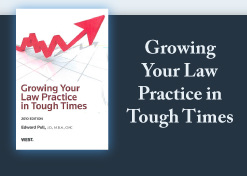|
What Business Are YOU In?
It is a truism that the law changes, but so too is the fact that lawyers have changed along with it. Until well into the post-World War II era, legal fees were based not only on time spent, but also the nature of the service, the result achieved and the amount at stake. Charging an appropriate legal fee was a matter of professional judgment for these "strategic lawyers." The strategic lawyer is the counselor, the type of generalist practitioner who used to be the standard of the legal profession.
Today, of course, many lawyers have often esoteric specialties, some right out of law school. Do lawyers need to focus on limited areas of practice to enhance our competencies and our credibility with clients? There is tremendous learning required to be competent in any given area of practice. Can one lawyer maintain his/her competence in many areas at the same time? Can one truly be a general practitioner in today's world, or must a firm be a group of specialists?
To answer these questions, a firm must answer one more: What business are you in? In other words, you should decide if you and your firm are in the business of providing general legal services across a wide range of disciplines, or specialized services to answer specific client needs. That in itself raises a full range of other questions:
• Who are my customers?
• Why do I want them - what challenges do they have that I find most satisfying?
• What is my value to them - the reason why they pick up the phone and call me rather than another lawyer?
To answer this last question, it ultimately is necessary to ask your clients why they hired you. The specific reasons they give will tell you what business you are in. In other words, the lawyer most in demand is one that provides services clients need. If your skills are no longer in hot demand, modify your practice area to adapt your skills to the needs of the clients. If you're in the larger firms, and are practicing real estate law currently,
you might be better advised to learn bankruptcy or workouts to adapt your current skills to the needs of the clients. If you're in a small firm or sole practice, this might be more difficult to accomplish with less personal economic impact, but still possible. The point is, just as the best way to catch a fish is to go where the fish are, the best way to get a client is to offer the kind of services clients want.
|
|

Following the worst economic crisis since the Great
Depression, and facing a sea change in clients' demands
and expectations, law firms must respond and adapt
quickly and effectively. Law firms must choose the kind of
law practice they will be; the marketing and business
development tactics they will use; the overhead that is
critical to their functioning; how to price, bill and collect
for services; and how to manage the cash flow cycle.
Success lies in identifying and capturing the right kinds of
clients, providing the services those clients need in ways
that add value, and ensuring prompt payment and the
ability to grow profits. This book, based on the
experiences of Ed and his clients over 20 years of
coaching and consulting, provides the keys to
successfully thriving in the new era.
Now Available
Special New Release Price: $79
Regular Price: $120
Call or Order Online at:
1-800-837-5880
www.lawbiz.com





|

|
|
|

Personal Commentary
An ounce of prevention is worth more than a pound of cure. A recent
white paper suggests that law departments can be more than an expense to
their companies, they can be profit centers. They can do this by
recovering money from vendors who breach their warranties, who are at
fault in product liabilities cases and similar modalities. It's easy to
measure ROI in those circumstances. It's more difficult to measure ROI
when you prevent harm from resulting by good lawyering in the first
place. See my blog post for further thoughts on this.
Sole and small firm lawyers, in particular, need to be more proactive in
providing preventive actions for their clients. The cure will always be
viewed as an expense. However, prevention can truly show your value to your
clients and they will pay more for perceived value than they will for
perceived expense.
Ed Poll
lawbiz.com
lawbizblog.com
www.LawBizForum.com
800-837-5880
Please use the URL below to link to this issue:
www.lawbiz.com/nlimages/tip-12-7-10.html
|

|

What Readers Are Saying...
"No matter how you slice it, there is
no substitute for wisdom and
experience. Ed Poll has
demonstrated both in this eyeopening
book about the essential
elements of running a profitable law
practice. He provides practical
wisdom along with simple ways to
adopt and incorporate best practices
for each. After explaining the pros
and cons of every decision, he makes
recommendations and provides
useful guides disguised as key
principles. Buy the book so you too
can access Ed's wisdom and
experience. It's worth much more
than the investment."
STEWART L. LEVINE. ESQ.,
FOUNDER, RESOLUTIONWORKS
AUTHOR, GETTING TO RESOLUTION;
THE BOOK OF AGREEMENT AND
COLLABORATION 2.0
|

|

|






